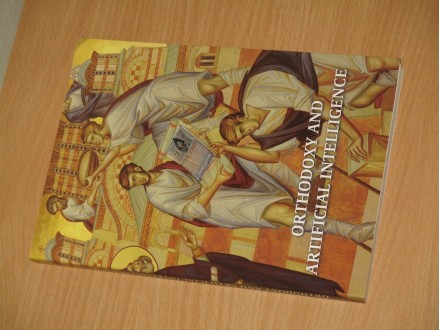Orthodoxy and Artificial Intelligence
| Cena: |
| Stanje: | Polovan bez oštećenja |
| Garancija: | Ne |
| Isporuka: | Pošta DExpress Post Express Lično preuzimanje |
| Plaćanje: | Tekući račun (pre slanja)
Pouzećem Lično |
Godina izdanja: Ostalo
ISBN: Ostalo
Autor: Domaći
Jezik: Engleski
168 strana, vrlo dobro očuvana, ilustrovana u boji, deo sadržaja ima na slikama, izdanje iz 2019, helenski institut, engleski jezik
Autori:
Aleksandar Petrović
Aleksandra Stevanović
Detaljniji opis:
Dictionary of Technology is a multi-layered manuscript composed of 162 lexicographic terms circularly referencing past and present epochal spirit of time as well as phenomenology of human mind in the light of modern technological processes. It was particularly unusual that the question of technology was raised in the form of a medieval manuscript, inverting an Enlightenment view on the world. Moreover, Dictionary of Technology restored the discourse of the premodern experience not only through its medieval expression, but primarily in its free-hand creation that rejected conceptually mechanical typing devices. These two pivot points are accompanied by intentional anonymity of the authors in accordance with the medieval creative canon, which, as a matter of circumstance, leaned on the postmodern idea of the „death of the author“.
The connection between technology and theology, which Dictionary of Technology pointed at in its own way is now obvious in the efforts to build a temple of technology – to lift technological operations above the earth, to follow the liturgy on mobile phones where artificial intelligence plays the role of a priest who performs communion. In all of that God is a robot with super-human abilities and people worship the new God for its intelligence supremacy. Creating a God (who is the Creator itself) would probably be far-fetched in the reality of a medieval man, but in the postmodern era where any fragmented reality is possible, this is yet another human hope. It is not hard to predict that AI spectacle will be soon more reliable and give more consolation to one believer than answers of an ordinary priest with his canonic edifications.
Šaljem i u inostranstvo, uplata moguća na paypal - Shipping internationally, worldwide!
Još puno zanimljivih knjiga na Kupindu,po povoljnim cenama
http://www./pretraga.php?Prodavac=alexvuk&Grupa=1
Uvek aktivne aukcije na Limundu
http://www.limundo.com/Clan/alexvuk/SpisakAukcija
Predmet: 69762525











